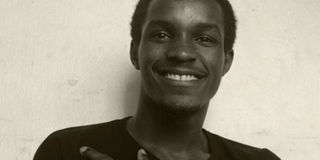Books They Read: Solomon Manzi

Manzi is a 21 year old Ugandan seeking to address social injustice and inequity. An avid debater – he has been to the World Universities’ Debating Championships, and volunteers with the Pan-African Movement, Uganda Chapter. He is a member of the Lantern Meet of Poets, and presently enrolled in a young writers’ project, ‘Writivism’. He spoke to Beatrice Lamwaka about his enthusiasm for books.
Why do you read fiction?
Fiction offers a chance to break free of the constraining precincts of the ‘real’ world. You could say it offers me a sixth sense or an additional “literary” dimension for thought which realist literature fails to achieve, owing to its inherent and ineluctable need to describe real-time events.
What kind of books do you read?
As a boy, I read a lot of starters both at home and in school - and I think because several of these had child protagonists, I developed a sub-conscious preference for child-heroes. Which is why I have devoured Mark Twain’s adventures over and over again, Charles Dickens’ Classics on Industrial-Revolution in London, Camara Laye’s African Child, Barbera Kimenye’s Moses Series and I also found John Grisham’s A Painted House very fascinating. Of late though, owing chiefly to my fraternity with the Lantern Meet of Poets, I am trying to “graduate” onto grander themes like philosophy. So, I am currently buried into Plato’s Symposium & Republic, as well as Cicero’s Orations.
How do you get back your books that you lend out?
Hehe! Admittedly, I find great difficulty in demanding for the return of any borrowed material owing to my natural aversion for confrontation. But lately – I have found that equals do make the best friends. Hence, if one requests to borrow a book from me, I often ask that they lend me one too. This way – when I call on the borrower – I am asking directly when I might return their book, but also impliedly asking when they will return mine.
Which books must you have in your bookshelf?
Apart from key references like the Bible and dictionary – I cannot do without African literature in my stock. I always find famous indigenous stories like Peter Abrams Mine Boy, Ngugi wa Thiong’o’s A Grain of Wheat, Timothy Wangusa’s Upon this Mountain or Meja Mwangi’s Carcass for Hounds very re-readable works. Largely – theirs are tales and characters I can readily identify with and locate common-ground upon, for constant comparison with my own life. I also draw endless daily inspiration from the Lantern Meet’s recently released poetry-anthology titled – Broken Voices of the Revolution.
Which books do you wish you had written?
If there is one such collection – it is Barbera Kimenye’s Moses Series. Her creative, simple, lovable and nostalgia-inducing portrayal of the typical life of an African boy in a secondary boarding school is a feat I fell in love with years ago, while in my Primary Seven. I am currently writing an autobiographical sketch of my own – and I have drawn so many lessons from Kimenye’s books.
Which books are you reading?
I am working on an autobiographical sketch – so I am reading philosophy and psychology to try and acquaint myself with the intricate workings of the human mind in a bid to explain some of my life’s choices hitherto. I am also engaged with the Writivism Project until August 2013; so I am reading as many African short stories as I can get my hands on. I have read stories from Nigeria’s Ukamaka Evelyn, Uganda’s Beatrice Lamwaka, Zimbabwe’s Noviolet Bulawayo, among others.




